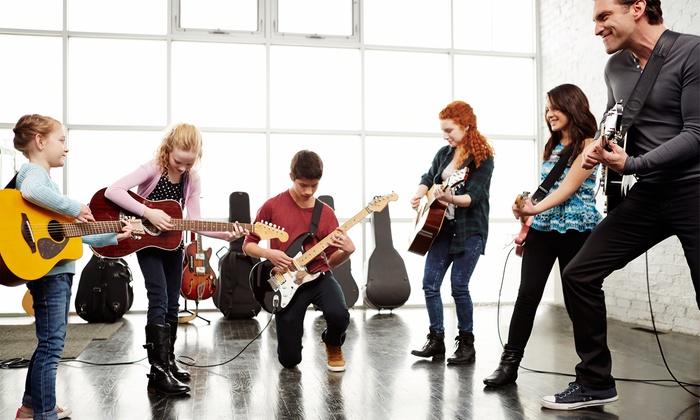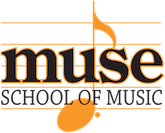|
Muse’s blog and magazine articles probe the burning music questions on everyone’s mind!
|
BEING A BEGINNER—or—THE PATH TO ROCK GOD STATUS
Tuesday, July 21, 2020 by Cara Walsh Dorman | Beginning Music

“I... Want to rock and roll all night. And party ev-er-y day,” said almost every soul with a pulse at some point in life. And really, who isn’t inspired to play music when they hear their favorite tunes come on the radio or when they watch another player dazzle every onlooker? Kids and adults equally are mesmerized by the power of music and by the performers who catch their ear. Once bitten by the bug, they are ready to launch into their own musical pursuit with dreams of the day they too can begin “dazzling” in their own right!
This is great! Inspiration is key to lighting the fire! When you can deny that groove in your soul no longer and decide you will dive in NOW with all the determination necessary from the next Adele, Slash, or Lindsey Sterling, it’s good to be armed with a little insight for your first foray into the world of music. What will it be like starting out as a beginner, whether that beginner is you or your child? What’s it going to take to become a “real” musician or at least a half-way decent player? That last question is one I hear frequently as a music teacher, and it’s an honest question that deserves an honest answer.
First off, let’s start with the obvious. Just as you suspected, learning music takes time and dedication. Yes, it’s true. And what you’ve heard about music being an art, a science, and a math—that’s true, too. At first this may seem academic and maybe a little intimidating, but just realize that those are the very aspects that make you love music so much! Don’t worry, your brain can handle it, and as you learn, it will thrive on this diverse information feed. But also remember this is also why it takes time to get good—your mind is doing some complex stuff as you play music!
Ok secondly, we need to talk about practice, and this is the big one. “Yes, of course mere mortals must practice,” you might be thinking, all the while secretly assuming the great ones just started playing with god-like skill the moment they touched the instrument. Ha, if only! This mythology appears in movies with regularity, but don’t kid yourself. Absolutely every musician you admire practiced A LOT to get where they’ve gotten to. The ups, downs, challenges, and successes in the practice room built the musician standing before you or crushing it on the airwaves. All the presumed “natural talent” that people want to attribute a musician’s ability to is NOT how they got good and gave them the depth of experience they hold. Nope. Pure practice, baby! There’s no replacement.
Let’s assume though that we’re not talking the world stage or mega concerts in sold out stadiums. How much practice will it take to be able to sit down and just play for yourself or feel comfortable playing in front of others? Much like a typical exercise regimen, I recommend a minimum of 30 minutes a day and at least 5 days per week to get the cumulative effect that allows for steady progress. After that, it comes down to the instrument, the type of music, and the person. Are we talking instruments that pretty much play one note at a time (violin, flute, trumpet) or those that play several or lots of notes at once (piano, guitar, ukulele)? Hint: an instrument that plays single notes will be faster to learn than one that plays multiple notes. And is your desire modern music or classical? Different styles take longer to conquer, depending on the intricacy. And you—what about you? How much are you willing to put into your practice? Time, energy, patience, and focus are your key elements here. The more you commit, the faster you advance.
Let’s focus on piano and guitar for examples since they are easily accessible and popular. Both can work as one-man-band type instruments, but are also frequently played in group settings. You can listen to solo piano or guitar music and not start to wonder where the rest of the music is. That’s because these chord-type instruments can be “the whole orchestra” with no need for additional players. It stands to reason that they also get the most complicated and layered (read: hardest) music to play and tend to take the longest to master. Piano and guitar are universally available though, so they still get the advantage of being most people’s first instrument. Timeframe to excellence? Infinity. But you can expect to comfortably be able to play basic music on guitar after 2-3 years of regular practice. With piano, it’s more like 5-6 years.
Wait, years?! Basic music?! What?! What if you’re not sure you can stick it out that long? Don’t psych yourself out here. With good instruction and regular practice, the incremental process of learning actually speeds along and everything becomes more natural and easy with every day you spend on the instrument. I find it helps when you relate the years on an instrument to other timelines in your life. How many years did it take to learn to walk and talk before you were just doing those things—three or four? How about something more mundane like: will you still be attending school 3+ years from now (kids)? Will you still hold the same job in the coming years (adults)? Living in the same house? Driving the same car you currently own? If you are practicing music the entire time these other timelines are running in the background, you will likely have a moment where you realize, “Hey, I’ve been playing the guitar for 4 years now, and it’s starting to feel like second nature!”
What starts on Day One of practice is something that will grab and intrigue you, and your mind and muscles will undergo experiences completely unique to learning music. These experiences are understood and fondly remembered by every single musician who was ever a beginner (um, all of them), so you’ll have this in common with every rock star you admire! So now all you have to ask yourself is… what are you waiting for? When will be your Day One?


